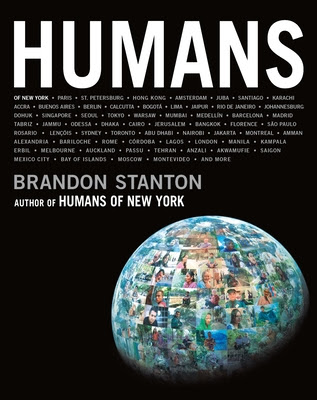Back in 2010 Brandon Stanton began a photography project to photograph 10,000 people on the streets of NYC; to create a catalog of the inhabitants of the city. He titled this project The Humans of New York. I am not on Instagram but I understand that he started posting the photos along with short stories and quotes to his account. Both my daughter and a niece were aware of his project not from a book, but from his on-line presence. Check out his website Humans of New York here.
Several years later Brandon Stanton expanded his project and has visited over 40 countries collecting photos and stories from people around the world. He is not trying to catalog people from every country and tribe, however. He is just collecting stories as a representation of humans everywhere. This book, Humans, is an outcome of that expanded project.
What I expected and what a got from my reading experience with Humans were two different things. First, I thought I'd look at cute, funny, odd, and inspiring photos of humans around the world with a sentence or two of where they lived and how they came to be photographed. What I got were well designed and arranged photos of people whose stories, some of them several pages long, often broke my heart. I wondered aloud to my husband mid-book, "Did Brandon go up to people and ask them to talk about the most depressing thing in their life for this book?" Of course my husband didn't know the answer but clearly there were LOTS of very depressing accounts recorded for the project. It wasn't until I reached page 277 of 437 that I found the answer to my question. Brandon said that once a person agreed to be photographed and interviewed, he would start with this question, "What is your greatest struggle right now?" What he got was what was weighing the person down, making their heart heavy. It was a powerful prompt.
Can you imagine a stranger coming up to you and asking such a deep, dark question? And then listening, really really listening to your response? It must have been a freeing experience being able to verbalize their fears, concerns, and cares to a nonjudgmental listener. No wonder so many accounts seem like their were drug up from the depths. In fact, Brandon said that he could tell when someone was telling the truth by the way their tale would come haltingly out of them, not in a fluid lighthearted way, but from a dark, hidden spot within them. He says that "struggles are transformative and they change people. The telling of ones story is part of that transformation. We relate much more to people's struggles than we do their victories. We empathize with pain more than joy."
What Brandon Stanton said here is true. I did find myself empathizing with the people whose stories I read. I was blown away. I know you will, too.
-Anne


No comments:
Post a Comment
I look forward to your comments and interactions! Join in the conversation.